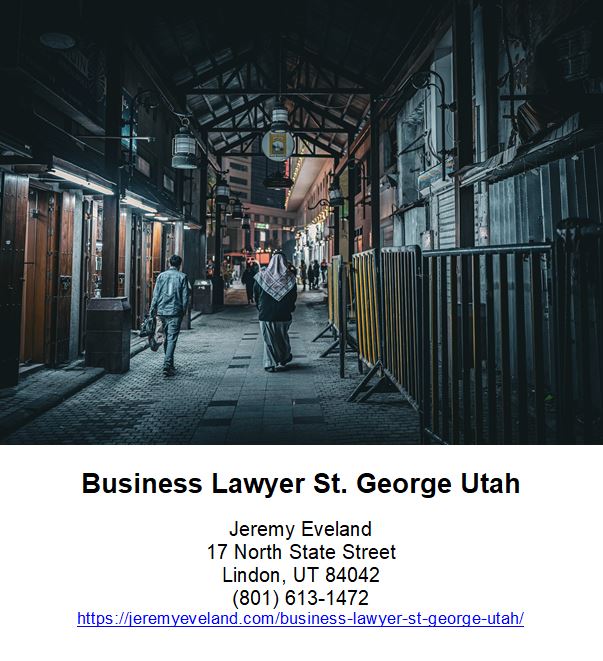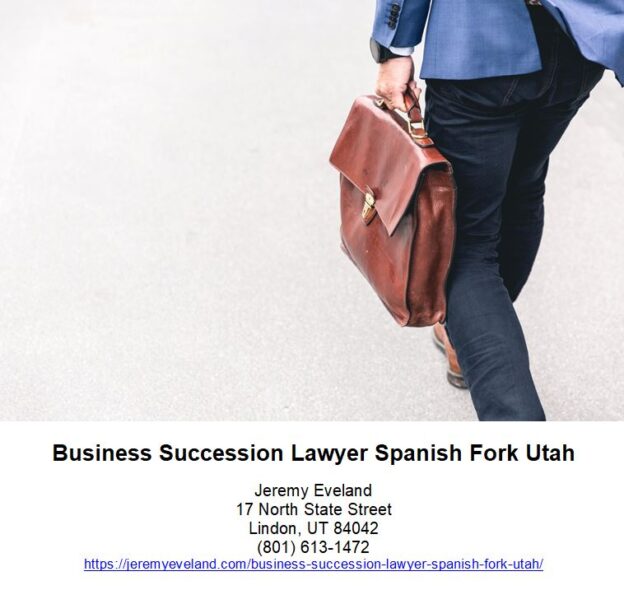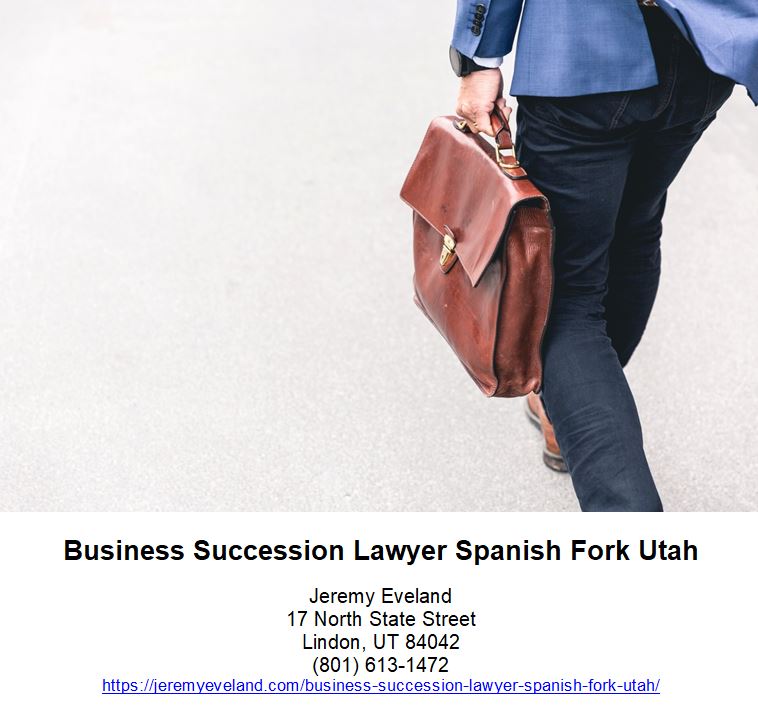-
Business Lawyer
- Introduction
- What Questions to Ask When Choosing a Pleasant Grove Business Succession Lawyer
- Exploring the Areas of Practice of Pleasant Grove Business Succession Lawyers
- The Benefits of Working with a Five-Star Rated Business Succession Lawyer in Pleasant Grove
- What to Look for in a Pleasant Grove Business Succession Lawyer
- How to Choose the Right Pleasant Grove Business Succession Lawyer for Your Needs
- Understanding the Benefits of Estate Planning with a Pleasant Grove Business Succession Lawyer
- What to Expect from a Pleasant Grove Business Succession Lawyer
- How to Find the Right Business Succession Lawyer in Pleasant Grove, Utah
“Secure Your Business’s Future with a Business Succession Lawyer in Pleasant Grove, Utah”
Introduction
Welcome to the Law Office of Business Succession Lawyer Pleasant Grove Utah. We are a full-service law firm dedicated to providing comprehensive legal services to businesses and individuals in the Pleasant Grove area. Our experienced attorneys specialize in business succession planning, estate planning, and asset protection. We understand the importance of protecting your business and your family’s future, and we are committed to helping you achieve your goals. Our team of experienced attorneys will work with you to develop a comprehensive plan that meets your needs and ensures your success. Whether you are looking to start a business, protect your assets, or plan for the future, we are here to help. Contact us today to learn more about how we can help you.
What Questions to Ask When Choosing a Pleasant Grove Business Succession Lawyer
1. What experience do you have in business succession law?
2. How familiar are you with the laws and regulations in Pleasant Grove?
3. What strategies do you recommend for business succession planning?
4. How do you ensure that the succession plan is tailored to the needs of my business?
5. What is your approach to resolving disputes between business owners?
6. How do you handle the transfer of assets and liabilities during a business succession?
7. What is your fee structure for business succession planning services?
8. How do you keep clients informed of the progress of their business succession plan?
9. What measures do you take to ensure that the succession plan is legally sound?
10. How do you ensure that the succession plan is in compliance with tax laws?
Exploring the Areas of Practice of Pleasant Grove Business Succession Lawyers
Business succession planning is an important part of any business owner’s long-term strategy. It involves the transfer of ownership and management of a business from one generation to the next. Pleasant Grove business succession lawyers specialize in helping business owners plan for the future of their business.
Business succession planning involves a variety of legal and financial considerations. Pleasant Grove business succession lawyers can help business owners navigate the complexities of the process. They can provide advice on the best way to structure the succession plan, including the transfer of ownership, management, and control of the business. They can also help business owners understand the tax implications of the succession plan and ensure that all legal requirements are met.
Pleasant Grove business succession lawyers can also provide guidance on the best way to protect the business’s assets. This includes drafting contracts and agreements to ensure that the business’s assets are protected in the event of a dispute or litigation. They can also help business owners understand the legal implications of transferring ownership and management of the business.
Pleasant Grove business succession lawyers can also provide advice on the best way to ensure that the business’s succession plan is carried out in accordance with the wishes of the business owner. This includes helping to draft wills and trusts to ensure that the business’s assets are distributed according to the wishes of the business owner. They can also provide advice on the best way to ensure that the business’s succession plan is carried out in a timely manner.
Pleasant Grove business succession lawyers can also provide advice on the best way to ensure that the business’s succession plan is carried out in a cost-effective manner. This includes helping to negotiate the terms of the succession plan and ensuring that the business’s assets are distributed in a way that is beneficial to all parties involved.
Pleasant Grove business succession lawyers can also provide advice on the best way to ensure that the business’s succession plan is carried out in a way that is in the best interests of the business’s stakeholders. This includes helping to draft shareholder agreements and other documents to ensure that the business’s assets are distributed in a way that is beneficial to all parties involved.
Pleasant Grove business succession lawyers can also provide advice on the best way to ensure that the business’s succession plan is carried out in a way that is in compliance with all applicable laws and regulations. This includes helping to draft contracts and agreements to ensure that the business’s assets are distributed in a way that is compliant with all applicable laws and regulations.
Pleasant Grove business succession lawyers can also provide advice on the best way to ensure that the business’s succession plan is carried out in a way that is in the best interests of the business’s employees. This includes helping to draft employment contracts and other documents to ensure that the business’s employees are treated fairly and in accordance with all applicable laws and regulations.
The Benefits of Working with a Five-Star Rated Business Succession Lawyer in Pleasant Grove
When it comes to business succession planning, it is important to work with a qualified and experienced lawyer. A five-star rated business succession lawyer in Pleasant Grove can provide you with the expertise and guidance you need to ensure that your business succession plan is successful. Here are some of the benefits of working with a five-star rated business succession lawyer in Pleasant Grove:
1. Expertise: A five-star rated business succession lawyer in Pleasant Grove has the expertise and experience to help you create a comprehensive and effective business succession plan. They understand the complexities of business succession planning and can provide you with the guidance and advice you need to ensure that your plan is successful.
2. Knowledge: A five-star rated business succession lawyer in Pleasant Grove has the knowledge and experience to help you navigate the legal aspects of business succession planning. They can help you understand the legal requirements and regulations that must be followed in order to ensure that your plan is successful.
3. Professionalism: A five-star rated business succession lawyer in Pleasant Grove is committed to providing you with the highest level of professionalism. They will work with you to ensure that your plan is tailored to your specific needs and goals.
4. Support: A five-star rated business succession lawyer in Pleasant Grove will provide you with the support and guidance you need throughout the process. They will be available to answer any questions you may have and provide you with the resources and information you need to ensure that your plan is successful.
By working with a five-star rated business succession lawyer in Pleasant Grove, you can be sure that your business succession plan is in good hands. They will provide you with the expertise, knowledge, and support you need to ensure that your plan is successful.
What to Look for in a Pleasant Grove Business Succession Lawyer
When searching for a Pleasant Grove business succession lawyer, it is important to consider a few key factors. First, it is important to find a lawyer who is experienced in business succession law. This means that the lawyer should have a thorough understanding of the legal issues involved in business succession planning, such as estate planning, tax planning, and asset protection. Additionally, the lawyer should have a good understanding of the local laws and regulations that may affect the succession process.
Second, it is important to find a lawyer who is knowledgeable about the specific needs of your business. This means that the lawyer should be able to provide advice on the best way to structure the succession process, as well as provide guidance on the legal documents that will be necessary to complete the process.
Third, it is important to find a lawyer who is willing to work with you to ensure that the succession process is successful. This means that the lawyer should be willing to listen to your concerns and provide advice on how to best address them. Additionally, the lawyer should be willing to work with you to ensure that the succession process is completed in a timely manner.
Finally, it is important to find a lawyer who is willing to provide ongoing support and guidance throughout the succession process. This means that the lawyer should be available to answer questions and provide advice as needed. Additionally, the lawyer should be willing to provide updates on the progress of the succession process and provide assistance in resolving any issues that may arise.
By taking the time to consider these factors, you can ensure that you find a Pleasant Grove business succession lawyer who is experienced, knowledgeable, and willing to provide the support and guidance necessary to ensure a successful succession process.
How to Choose the Right Pleasant Grove Business Succession Lawyer for Your Needs
When it comes to selecting a Pleasant Grove business succession lawyer, it is important to choose one who is experienced and knowledgeable in the area of business succession law. A business succession lawyer can help you navigate the complex legal process of transferring ownership of a business from one generation to the next. Here are some tips to help you choose the right Pleasant Grove business succession lawyer for your needs.
1. Research the lawyer’s experience and qualifications. Make sure the lawyer you choose has experience in business succession law and is knowledgeable about the laws in your state. Ask for references and check their credentials.
2. Ask about their fees. Business succession lawyers typically charge an hourly rate or a flat fee. Make sure you understand the fee structure before you hire a lawyer.
3. Consider the lawyer’s communication style. It is important to find a lawyer who is willing to listen to your concerns and answer your questions. Make sure the lawyer is available to answer your questions and provide updates on the progress of your case.
4. Ask about their approach to business succession law. Different lawyers may have different approaches to business succession law. Make sure the lawyer you choose is familiar with the laws in your state and has a strategy for helping you achieve your goals.
5. Consider the lawyer’s reputation. Check online reviews and ask for references from other clients. Make sure the lawyer you choose has a good reputation in the legal community.
By following these tips, you can find the right Pleasant Grove business succession lawyer for your needs. With the right lawyer, you can ensure that your business succession process is handled properly and efficiently.
Understanding the Benefits of Estate Planning with a Pleasant Grove Business Succession Lawyer
Estate planning is an important part of any business succession plan. It is a process of planning for the future of a business and its assets, and it can help ensure that the business is passed on to the right people in the right way. A Pleasant Grove business succession lawyer can help you understand the benefits of estate planning and how it can help you protect your business and its assets.
Estate planning can help you ensure that your business is passed on to the right people in the right way. It can help you determine who will receive the business assets, how they will be distributed, and when they will be distributed. This can help you ensure that your business is passed on to the right people in the right way, and that your wishes are respected.
Estate planning can also help you protect your business assets from creditors and other claims. It can help you create a plan that will protect your business assets from creditors and other claims, and it can help you ensure that your business assets are distributed in the way that you want them to be.
Estate planning can also help you minimize taxes. It can help you create a plan that will minimize the amount of taxes that you have to pay on your business assets. This can help you save money and ensure that your business assets are distributed in the way that you want them to be.
Finally, estate planning can help you ensure that your business is passed on to the right people in the right way. It can help you create a plan that will ensure that your business is passed on to the right people in the right way, and that your wishes are respected.
A Pleasant Grove business succession lawyer can help you understand the benefits of estate planning and how it can help you protect your business and its assets. They can help you create a plan that will ensure that your business is passed on to the right people in the right way, and that your wishes are respected. They can also help you minimize taxes and ensure that your business assets are distributed in the way that you want them to be. With the help of a Pleasant Grove business succession lawyer, you can ensure that your business is passed on to the right people in the right way, and that your wishes are respected.
What to Expect from a Pleasant Grove Business Succession Lawyer
A Pleasant Grove business succession lawyer can provide invaluable assistance to business owners who are looking to transition their business to the next generation. Whether you are looking to pass on your business to a family member, a partner, or a third party, a Pleasant Grove business succession lawyer can help you navigate the legal complexities of the process.
When you work with a Pleasant Grove business succession lawyer, you can expect to receive comprehensive legal advice and guidance. Your lawyer will help you understand the legal implications of transferring ownership of your business, and will provide you with the necessary documents to ensure that the transition is legally sound. Your lawyer will also help you understand the tax implications of the transfer, and will provide you with strategies to minimize the tax burden.
Your Pleasant Grove business succession lawyer will also help you create a succession plan that meets your needs. This plan will outline the steps that need to be taken to ensure a smooth transition of ownership, and will provide guidance on how to handle any disputes that may arise. Your lawyer will also help you create a plan for the future of the business, including how to manage the business after the transition is complete.
Finally, your Pleasant Grove business succession lawyer will provide you with ongoing legal advice and support throughout the process. Your lawyer will be available to answer any questions you may have, and will provide you with the necessary resources to ensure that the transition is successful. With the help of a Pleasant Grove business succession lawyer, you can rest assured that your business will be in good hands.
How to Find the Right Business Succession Lawyer in Pleasant Grove, Utah
If you are looking for a business succession lawyer in Pleasant Grove, Utah, it is important to find an experienced attorney who can help you navigate the complexities of business succession planning. Here are some tips to help you find the right lawyer for your needs:
1. Research local attorneys: Start by researching local attorneys who specialize in business succession law. Look for attorneys who have experience in the Pleasant Grove area and who have a good reputation in the community. Check online reviews and ask for referrals from trusted sources.
2. Ask questions: Once you have identified a few potential attorneys, contact them to ask questions about their experience and qualifications. Ask about their experience in business succession law, their fees, and their availability.
3. Schedule a consultation: Once you have narrowed down your list of potential attorneys, schedule a consultation to discuss your case in more detail. During the consultation, ask questions about the attorney’s experience and approach to business succession law.
4. Consider cost: When selecting a business succession lawyer, it is important to consider the cost of their services. Ask about their fees and payment plans to ensure that you can afford their services.
By following these tips, you can find the right business succession lawyer in Pleasant Grove, Utah. With the right attorney, you can ensure that your business succession plan is properly executed and that your interests are protected.
Areas We Serve
We serve individuals and businesses in the following locations:
Salt Lake City Utah
West Valley City Utah
Provo Utah
West Jordan Utah
Orem Utah
Sandy Utah
Ogden Utah
St. George Utah
Layton Utah
South Jordan Utah
Lehi Utah
Millcreek Utah
Taylorsville Utah
Logan Utah
Murray Utah
Draper Utah
Bountiful Utah
Riverton Utah
Herriman Utah
Spanish Fork Utah
Roy Utah
Pleasant Grove Utah
Kearns Utah
Tooele Utah
Cottonwood Heights Utah
Midvale Utah
Springville Utah
Eagle Mountain Utah
Cedar City Utah
Kaysville Utah
Clearfield Utah
Holladay Utah
American Fork Utah
Syracuse Utah
Saratoga Springs Utah
Magna Utah
Washington Utah
South Salt Lake Utah
Farmington Utah
Clinton Utah
North Salt Lake Utah
Payson Utah
North Ogden Utah
Brigham City Utah
Highland Utah
Centerville Utah
Hurricane Utah
South Ogden Utah
Heber Utah
West Haven Utah
Bluffdale Utah
Santaquin Utah
Smithfield Utah
Woods Cross Utah
Grantsville Utah
Lindon Utah
North Logan Utah
West Point Utah
Vernal Utah
Alpine Utah
Cedar Hills Utah
Pleasant View Utah
Mapleton Utah
Stansbury Par Utah
Washington Terrace Utah
Riverdale Utah
Hooper Utah
Tremonton Utah
Ivins Utah
Park City Utah
Price Utah
Hyrum Utah
Summit Park Utah
Salem Utah
Richfield Utah
Santa Clara Utah
Providence Utah
South Weber Utah
Vineyard Utah
Ephraim Utah
Roosevelt Utah
Farr West Utah
Plain City Utah
Nibley Utah
Enoch Utah
Harrisville Utah
Snyderville Utah
Fruit Heights Utah
Nephi Utah
White City Utah
West Bountiful Utah
Sunset Utah
Moab Utah
Midway Utah
Perry Utah
Kanab Utah
Hyde Park Utah
Silver Summit Utah
La Verkin Utah
Morgan Utah
Business Succession Lawyer Pleasant Grove Utah Consultation
When you need help from a Business Succession Lawyer Pleasant Grove Utah call Jeremy D. Eveland, MBA, JD (801) 613-1472 for a consultation.
Jeremy Eveland
17 North State Street
Lindon UT 84042
(801) 613-1472
Related Posts
Using Disclaimers In Estate Planning
Business Succession Lawyer Spanish Fork Utah
Corporate Attorney St. George Utah
Business Strategy and Consulting
Business Succession Lawyer Roy Utah
Business Lawyer St George Utah














